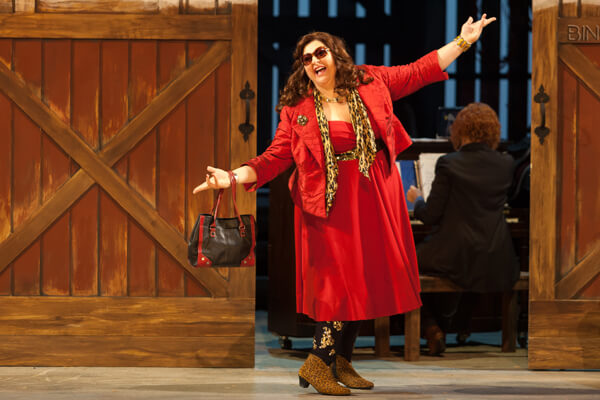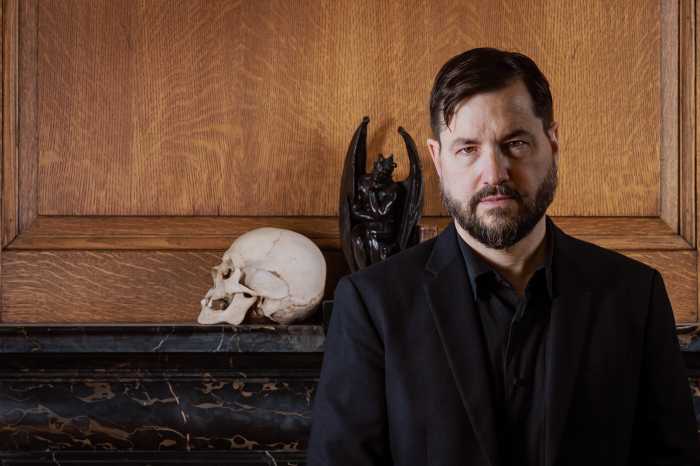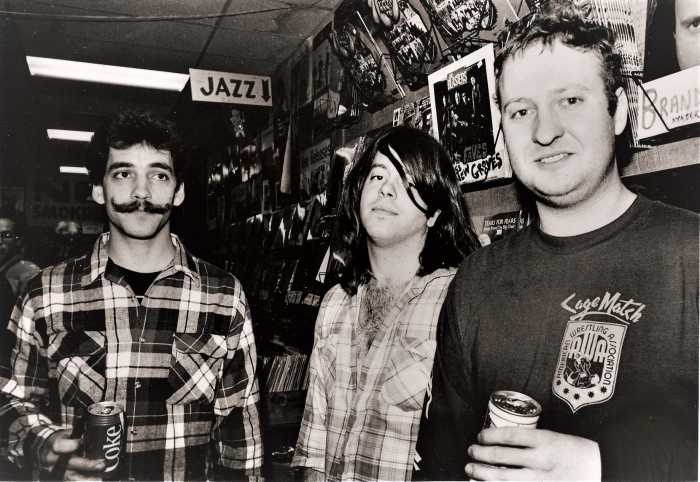Christine Goerke as Prima Donna in the Glimmerglass production of Strauss’ “Ariadne in Naxos.” | KARLI CADEL/ GLIMMERGLASS FESTIVAL
Artistic and general director Francesca Zambello and managing director Linda Jackson crafted a Glimmerglass season of operas unified by both thematic plot links — women abandoned by men — and a performance history trope of being revised versions of originals. Strauss’ “Ariadne auf Naxos” and Puccini’s “Madama Butterfly” got played in their now-familiar iterations, the Puccini reverting, as often happens, to a seamless transition between second and third acts. Tobias Picker and Gene Scheer’s “An American Tragedy” marked the unveiling of a stripped-down version of a piece that Zambello directed expansively at its 2005 Met world premiere.
Zambello’s “Ariadne” (August 23) emerged truly festival-quality, a novel take on an already extraordinarily proto-modernist work. Kathleen Kelly worked wonders in the pit. Zambello made this backstage comedy “local” by situating the action as a one-off upscale barn event. Troy Hourie’s neon–draped barn set situated “Naxos, NY” in the state’s “Classical Belt,” whose place names range from Troy to Syracuse. It later slimmed to reveal a silhouette smartly suggesting the theater we were in, and at the opera’s transfiguring conclusion it flew out altogether, leaving the magic of Mark McCullough’s lighting. Nowhere that I see opera is lighting so consistently brilliant as at Glimmerglass.
After last year’s mauling of Verdi’s “Un giorno di regno” — Kelley Rourke’s translation aiming for and hitting the most groan-inducing sitcomspeak, destroying the work’s fragile charm entirely — I had misgivings about her doing the English adaptation of “Ariadne.” A few cheap shots aside, though, Rourke did very well this time, sometimes wandering from the words’ authentic meanings, but usually in productive directions.
Cooperstown’s summer opera season succeeds with “Ariadne,” “Butterfly”; “American Tragedy” lags
The Prologue worked best for those who already knew “Ariadne.” Contemporary gags increased its inherent busyness, as when dominatrix Zerbinetta placed a sight gag State Trooper in cuffs. Such antics needed a lighter, less repetitive directorial touch.
Actor Wynn Harmon, as the Master of the Estate, had the professional savvy to be more interactive and less monotonously imperious than the usual nasal, queeny Haushofmeister. The “trouser” soprano role of the Composer stayed in trousers but became a lesbian rather than a young man. Why not? Catherine Martin’s characterization of an endearing, neurotic perfectionist was treasurable, and her bright middle voice really grabs attention. However, as with many mezzo Composers, she just couldn’t produce high notes with sufficient ease, marring the climaxes. The four male apprentices courting Zerbinetta looked duly urban punk, moved supply, and had fun, but sounded like what they were — good apprentices, not quite up to Strauss’s sophisticated writing..
The second part –– the “opera” –– worked wonderfully. Here the “singers” switched to German while the commedia troupe held to Rourke’s English. Rachele Gilmore’s Zerbinetta did creditably by her long aria and ended the opera convincingly paired with Martin’s Composer. Zambello grasps that the commedia troupe actually learns something from Ariadne and the Prima Donna playing her; the two women mutually support one another.
Christine Goerke displayed fabulous comic timing and energy in the Prologue; her Ariadne was world-class, sweeping all in her full-throated yet constantly nuanced wake. Rarely do Ariadnes command such sumptuous lower registers or move so well onstage. Goerke started at Glimmerglass as an apprentice in 1993; this was a triumphant return. Corey Bix may not have the most mellifluous timbre but faced Bacchus’ severe challenges without flinching or tiring. He was worth saluting, as were Jacqueline Echols (Echo) and Beth Lytwynec (Dryad).
That night, Zambello’s other staging, “Madama Butterfly,” also succeeded, though she indulged in two petal drops. The main innovation — centering the drama on the American characters, often shown in the consulate, required some leaps of faith –– and selective translation. In this reading, Sharpless (an excellent, fully formed vocal and theatrical portrayal by Aleksey Bogdanov, after Goerke the summer’s breakaway star) confronts Eurasian babies 24/ 7; why is he so shattered by the revelation of Butterfly’s son?
But, led with italianate fire by Joseph Colaneri, the show—again, beautifully lit (Robert Wierzel) and handsomely set (Michael Yeargan) with a post-1912 48-star flag — made one think.
It also set off a fine Butterfly by Yunah Lee. The Korean lyric soprano specializes in this role; her voice has hardened in tougher sections since I heard her in 2009 — the Entrance didn’t bode well –– but the portrayal is expert. Lee projects the text well. Cio-Cio-San is full of Major Moments; Lee manages some with great skill, some at least acceptably.
Dinyar Vania (Pinkerton) has pushed his voice into premature calcification, sounding like a generic provincial arena tenor and showing routine textual connection. Kristen Choi made a fine Suzuki, sonorous and moving. Sean Michael Plumb sang Yamadori well.
Peter Kazaras’ barebones “American Tragedy” staging (August 24) rarely took fire; George Manahan did not make the score impress except in its dependence on Prokofiev-like rhythm. No character has a distinct musical idiolect: Picker has everyone soar to unmotivated high notes that challenged some of the hardworking apprentice cast.
Christian Bowers sang very solidly but, though “a nice-looking guy,” simply lacked the magnetism to incarnate Clyde, who must be irresistibly and enviably handsome for Dreiser’s plot to make sense. Cynthia Cook, a Marilyn lookalike as the rich temptress Sondra, was more apt physically and temperamentally for the role than its creator Susan Graham, but her singing was grainy and unmemorable.
As Clyde’s poor victim Roberta, the sympathetic Vanessa Isiguen showed a nice lyric soprano but less command on top than the young Patricia Racette. Bogdanov again shone in a fully rounded study of Clyde’s uncle Samuel. The deleted opening scenes were actually missed, since here Clyde’s devout mother Elvira came out of nowhere. Still, Patricia Schuman’s enduring professionalism and musicality proved very impressive.
David Shengold (shengold@yahoo.com) writes about opera for many venues.





































